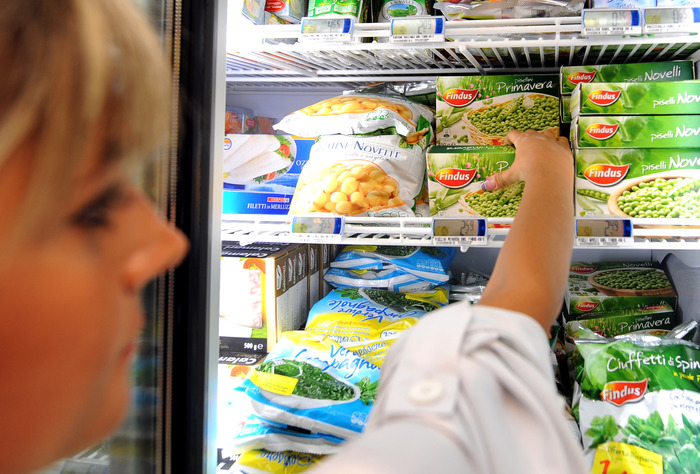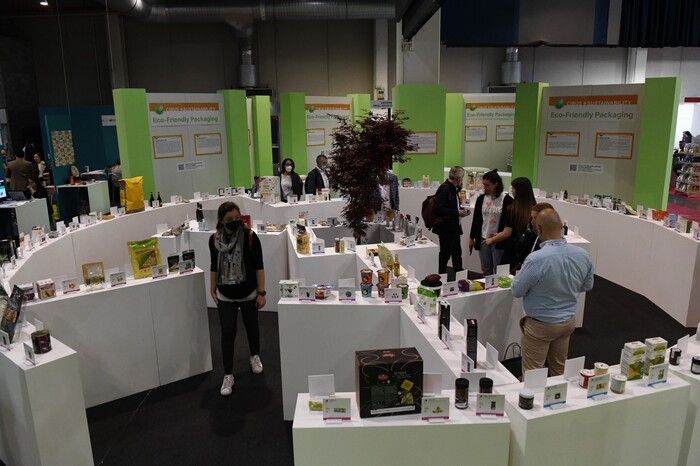Enlarge image
Michelle Davids shopping in Cape Town, South Africa: The policewoman rarely buys vegetables - too expensive
Photo: Brenton Geach / DER SPIEGEL
Michelle Davids has largely eliminated vegetables from the family's menu.
She hardly buys fruit either, too expensive.
"Meat is out of the question," she says.
She used to have barbecues with her family twice a month.
"You can do that once every three months," says Davids, 32, a policewoman from Cape Town, South Africa.
Instead of "normal chicken" she is now buying so-called molded meat. "I know vegetables would be healthier," says Davids. But if she has to choose between an avocado and a loaf of bread, then she'll take the bread and a cheap peanut butter. “That'll keep us full for a few days at least.” She can't afford the powdered milk for her two-year-old daughter either.
With the onset of the pandemic, the family's life changed radically: David's husband lost his well-paid job as a tourist guide in Cape Town. With only one income left, the family had no choice but to move back in with David's parents with their two daughters Kenya, 2, and Cassidy, 14. Now the four of them live in a room in the poor suburb of Sea Winds. Nevertheless, says Davids, a strong woman with friendly eyes, she is grateful: after all, her job with the police is safe.
It is the story of a perfectly normal family, a story that could be told a million times around the world.
With the beginning of the pandemic, people, especially in emerging and developing countries, lost income.
At the same time, however, food prices have risen sharply.
It's a mix that worries experts.
One of the United Nations' most important development goals - eradicating hunger in the world by 2030 - has thus moved a long way off.
"We could fall back a decade," says Ervin Prifti, an economic analyst at the International Monetary Fund (IMF).
Together with two colleagues, the researcher analyzed data from the past and made a forecast.
Economic growth is therefore the decisive factor in reducing malnutrition;
real loss of income leads to hunger.
In 2020 alone, more than 60 million people worldwide could also have slipped into a state of malnutrition or hunger. Other estimates assume up to 130 million people. Prifti's researchers warn of “food insecurity as one of the most dramatic collateral damage caused by the pandemic”.
Even before the corona crisis, 680 million people were not adequately fed. In addition to seven African countries - including South Sudan, Nigeria, the Democratic Republic of the Congo and Ethiopia - Syria and Yemen in the Middle East, as well as Haiti and Afghanistan, are particularly hard hit. A new report by the aid organization Oxfam shows that the number of people suffering from severe hunger worldwide increased almost six-fold from the end of 2019 (i.e. before the start of the corona pandemic) to June 2021. "Conflict regions still harbor the greatest risk of hunger crises," says economist Moniko Tothova from the Food and Agriculture Organization of the United Nations (FAO).
But now the problem threatens to widen massively - with dramatic consequences. "Malnutrition can lead to social unrest in the short term," says Prifti, "and in the long term to reduced productivity, a reduction in the development potential of people and countries."
The FAO's food price index rose 31 percentage points between March 2020 and June 2021.
It is true that this is an average value that importers have to pay - in other words, it is not about retail prices.
But the rise in prices for staple foods is also noticeable worldwide in supermarkets and market stalls: South Africans now have to spend around 30 percent more on tomatoes, vegetable oils and beans than they did a year ago.
In Brazil people are complaining about rising prices for beef, chicken and rice, in India the traditional Dal soup is now significantly more expensive.
Various global and local factors play a role in the rise in consumer prices. The South African agronomist Wandile Shilobo puts it this way: "Pandemic meets climate change."
The rise in food prices began before the corona crisis, the IMF analysts point to in a blog post.
At the beginning of the pandemic, lockdowns, hamster purchases and export bans for rice or wheat would have disrupted the supply chains and caused price increases.
Added to this are the increased transport costs, which also have an impact on consumer prices.
Freight transport by ship has become more than twice as expensive in the past twelve months, numerous passenger flights have been eliminated - food was also brought from A to B with this.
The more expensive gasoline and regional bottlenecks for truck drivers have also made road transport more expensive.
Meanwhile, the demand for agricultural goods remained high, partly because China decided to fill its pantries and buy large quantities of soy.
The worldwide increased demand for biodiesel also made vegetable oils more expensive.
At the same time, there were extreme weather conditions that disrupted palm oil production in Indonesia, for example, and led to droughts and poor harvests in many traditional exporting countries, such as Brazil, Argentina, but also Russia, Ukraine and the United States.
However, the latter factors have so far mainly affected the price that manufacturers can charge for their goods.
It has increased by more than 40 percent.
"However, this development only partially seeps through to the consumer over time and has hardly been received so far," says the analyst Prifti. "We therefore expect further increases in food prices in the next few months."
So-called food inflation, i.e. the rise in prices for consumers, does not have the same impact in all regions of the world.
Developing and emerging countries are much more affected, especially if they are heavily dependent on imports.
While local agricultural production hardly declined, since according to FAO economist Thotova agricultural workers were mostly exempt from quarantine rules, the lockdowns probably disrupted supply chains and regional transport routes.
This led to bottlenecks that made fruit and vegetables, but also grain, more expensive.
Street vendors could not work at times, markets remained closed and people had to shop in the more expensive supermarkets.
As a result, prices in sub-Saharan Africa rose by up to 200 percent in some places.
There is a threat of famine "because incomes have collapsed at the same time," says Thotova.
In addition, the continent is currently in the
third corona wave.
The situation is particularly critical in many countries in the Global South and the Middle East where economic crises meet hyperinflation, such as in Nigeria or Lebanon: the devaluation of national currencies against the dollar makes food imports more expensive. This is likely to create further problems in the months ahead, particularly for countries in Sub-Saharan Africa, the Middle East and North Africa that rely heavily on these imports.
In order to cushion the food shock and its consequences, the IMF scientists around Prifti see the increase in government spending, i.e. payments to the poorest, as an adequate means.
"It is usually not the case that no food is available, people just can't afford it," says Prifti.
Various countries operated in the crisis with a kind of unconditional basic income.
Brazil, for example, paid some kind of emergency aid to those in need in 2020.
There was also a similar program in South Africa, according to which the poorest received 350 rand, which has since been discontinued as well.
"What hurts me most is that many countries here simply do not have the financial means to set up such programs," says the South African agricultural economist
Shilobo.
Despite her own hardship, the South African policewoman Davids has meanwhile started a small aid program for needy children from the neighborhood.
Every Monday, Wednesday and Thursday she gives meals in front of her house to up to 150 hungry children who are queuing on the street with Tupperware they have brought with them.
Davids asks for donations on Facebook.
She uses it to buy chicken necks, bread, or whatever is cheap.
"I do what I can," she says, "but sometimes there are just too many."
This contribution is part of the Global Society project
Expand areaWhat is the Global Society project?
Reporters from
Asia, Africa, Latin America and Europe
report under the title “Global Society”
- on injustices in a globalized world, socio-political challenges and sustainable development.
The reports, analyzes, photo series, videos and podcasts appear in the international section of SPIEGEL.
The project is long-term and will be supported by the Bill & Melinda Gates Foundation (BMGF) for three years.
A detailed FAQ with questions and answers about the project can be found here.
AreaWhat does the funding look like in concrete terms?
The Bill & Melinda Gates Foundation (BMGF) is supporting the project for three years with a total of around 2.3 million euros.
Are the journalistic content independent of the foundation?
Yes.
The editorial content is created without the influence of the Gates Foundation.
Do other media have similar projects?
Yes.
Big European media like "The Guardian" and "El País" have set up similar sections on their news sites with "Global Development" and "Planeta Futuro" with the support of the Gates Foundation.
Have there already been similar projects at SPIEGEL?
In recent years, SPIEGEL has already implemented two projects with the European Journalism Center (EJC) and the support of the Bill & Melinda Gates Foundation: the “Expedition ÜberMorgen” on global sustainability goals and the journalistic refugee project “The New Arrivals”, as part of this several award-winning multimedia reports on the topics of migration and flight have been produced.
Where can I find all publications on global society?
The pieces can be found at SPIEGEL on the topic Global Society.















